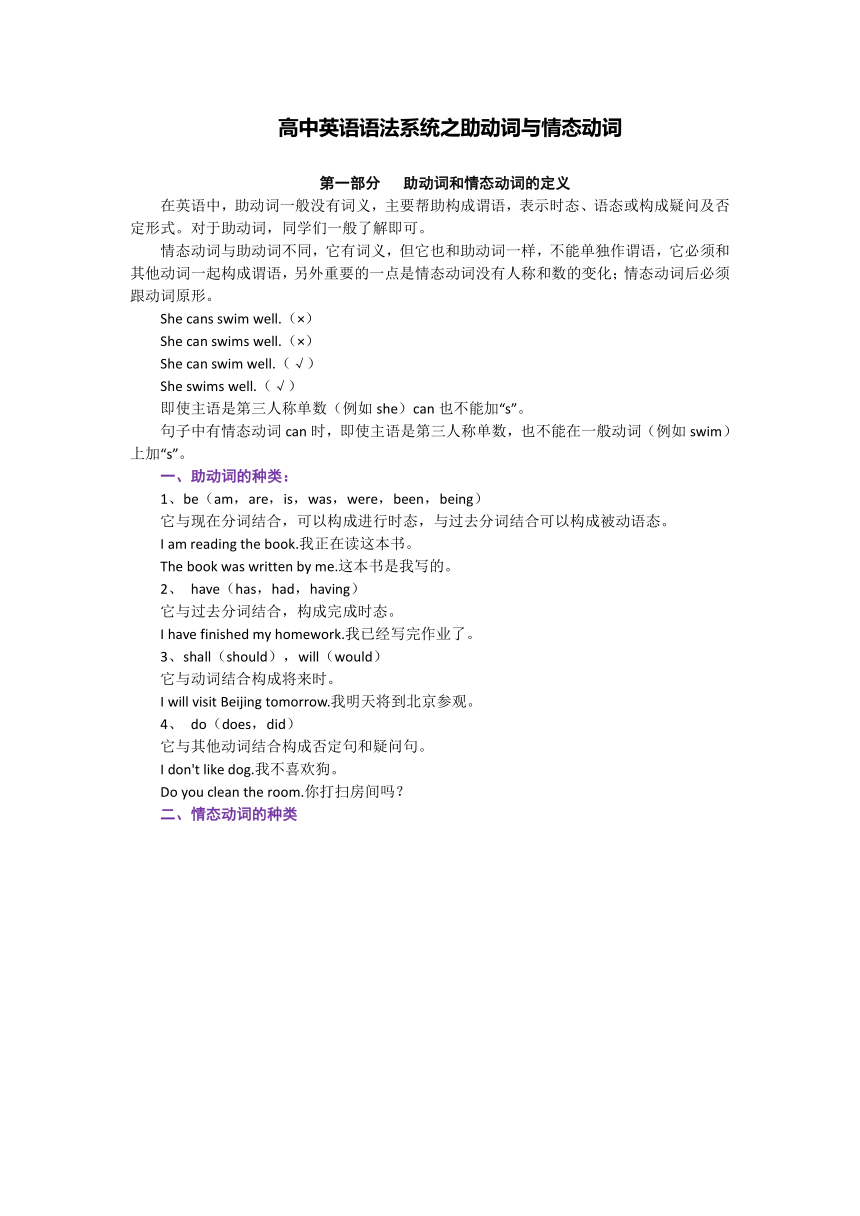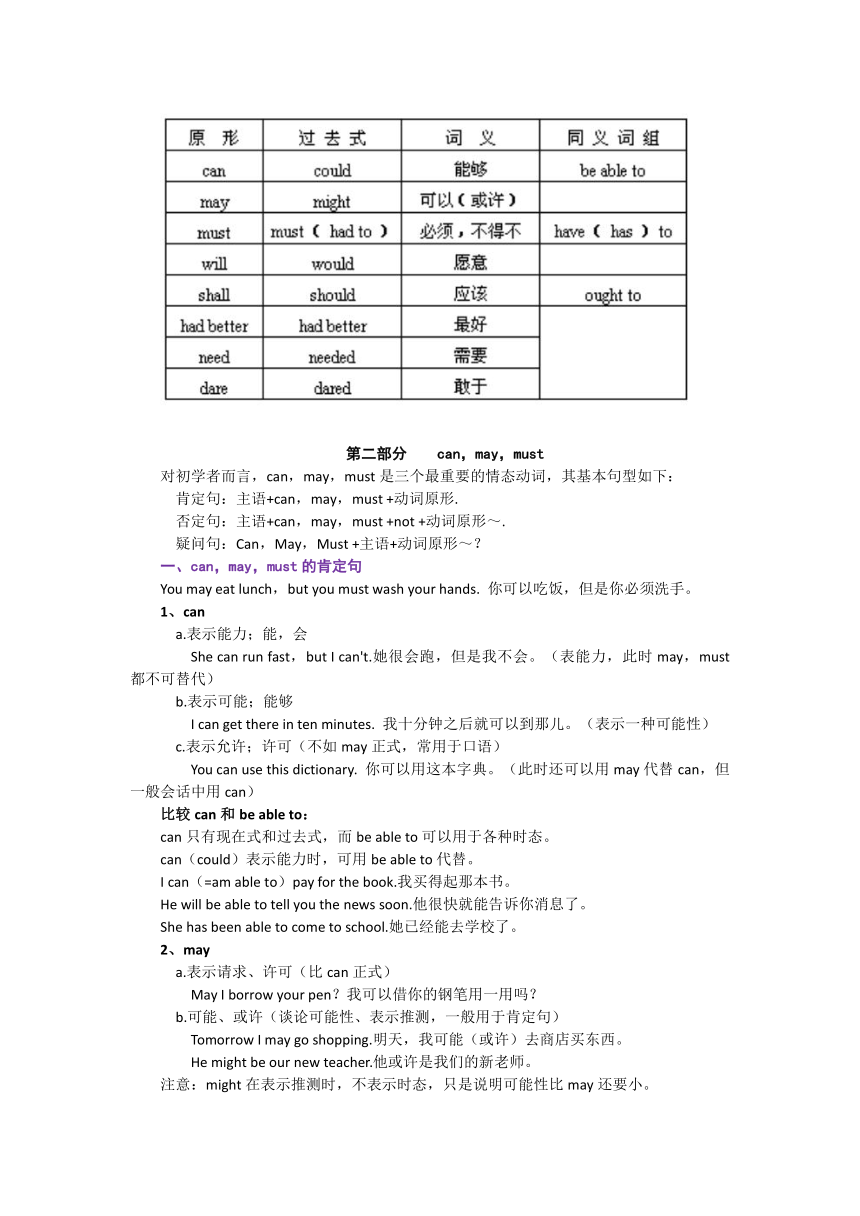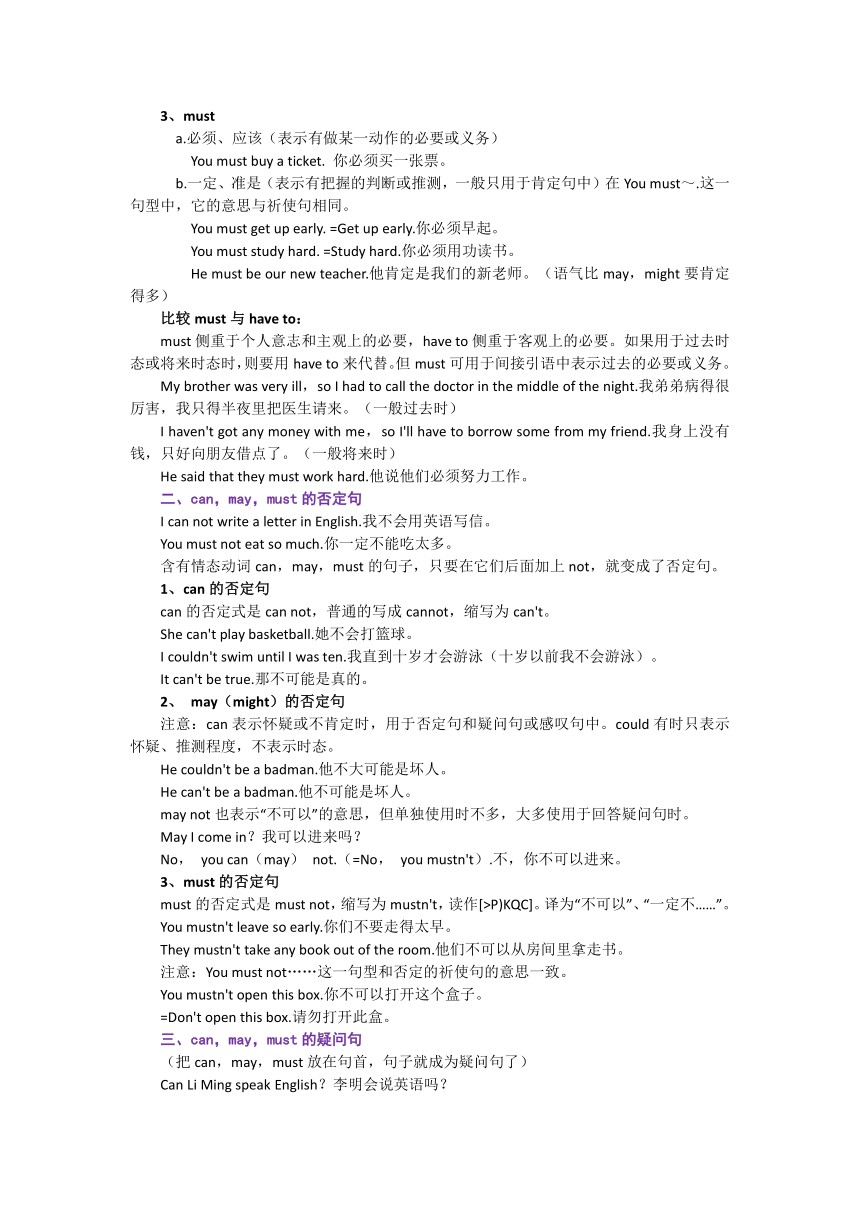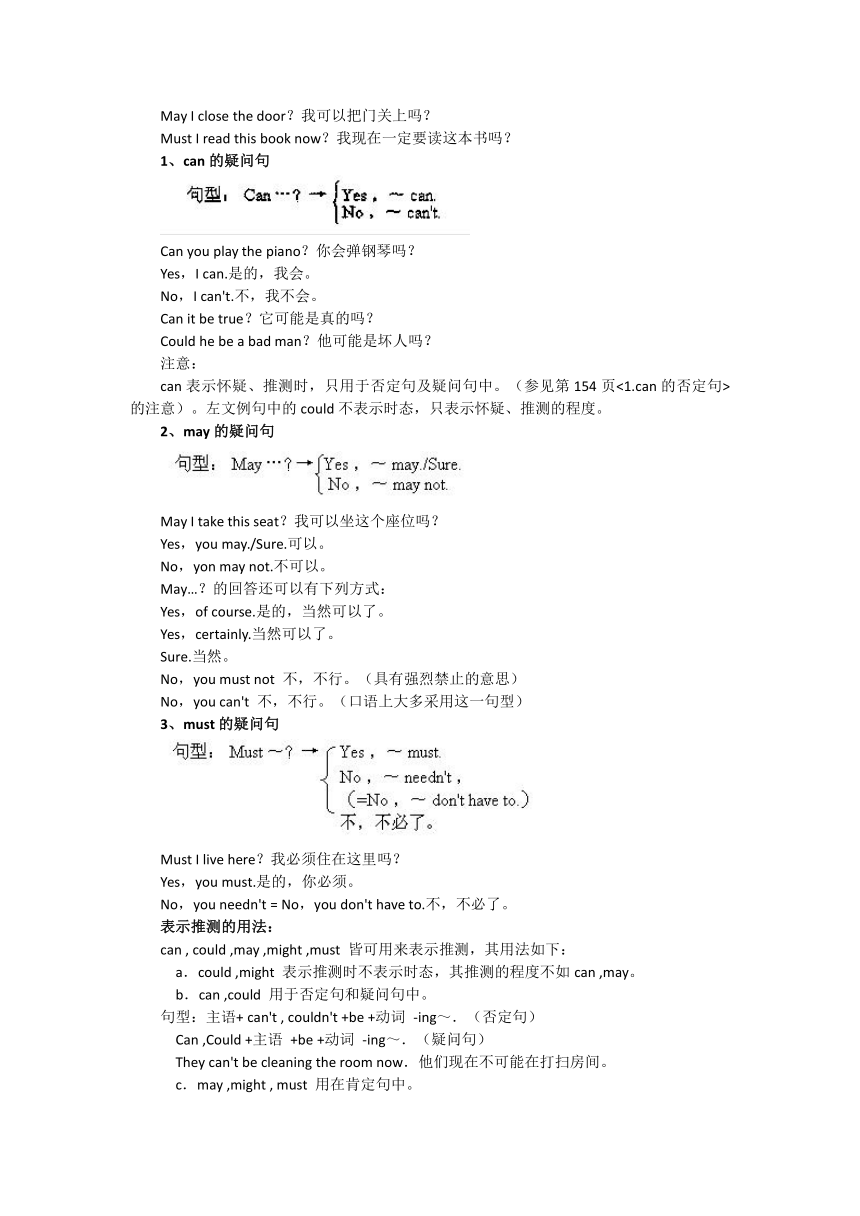高考英语语法系统之助动词与情态动词学案(无答案)
文档属性
| 名称 | 高考英语语法系统之助动词与情态动词学案(无答案) |  | |
| 格式 | doc | ||
| 文件大小 | 127.0KB | ||
| 资源类型 | 教案 | ||
| 版本资源 | 通用版 | ||
| 科目 | 英语 | ||
| 更新时间 | 2023-02-02 18:32:04 | ||
图片预览




文档简介
高中英语语法系统之助动词与情态动词
第一部分 助动词和情态动词的定义
在英语中,助动词一般没有词义,主要帮助构成谓语,表示时态、语态或构成疑问及否定形式。对于助动词,同学们一般了解即可。
情态动词与助动词不同,它有词义,但它也和助动词一样,不能单独作谓语,它必须和其他动词一起构成谓语,另外重要的一点是情态动词没有人称和数的变化;情态动词后必须跟动词原形。
She cans swim well.(×)
She can swims well.(×)
She can swim well.(√)
She swims well.(√)
即使主语是第三人称单数(例如she)can也不能加“s”。
句子中有情态动词can时,即使主语是第三人称单数,也不能在一般动词(例如swim)上加“s”。
一、助动词的种类:
1、be(am,are,is,was,were,been,being)
它与现在分词结合,可以构成进行时态,与过去分词结合可以构成被动语态。
I am reading the book.我正在读这本书。
The book was written by me.这本书是我写的。
2、 have(has,had,having)
它与过去分词结合,构成完成时态。
I have finished my homework.我已经写完作业了。
3、shall(should),will(would)
它与动词结合构成将来时。
I will visit Beijing tomorrow.我明天将到北京参观。
4、 do(does,did)
它与其他动词结合构成否定句和疑问句。
I don't like dog.我不喜欢狗。
Do you clean the room.你打扫房间吗?
二、情态动词的种类
第二部分 can,may,must
对初学者而言,can,may,must是三个最重要的情态动词,其基本句型如下:
肯定句:主语+can,may,must +动词原形.
否定句:主语+can,may,must +not +动词原形~.
疑问句:Can,May,Must +主语+动词原形~?
一、can,may,must的肯定句
You may eat lunch,but you must wash your hands. 你可以吃饭,但是你必须洗手。
1、can
a.表示能力;能,会
She can run fast,but I can't.她很会跑,但是我不会。(表能力,此时may,must都不可替代)
b.表示可能;能够
I can get there in ten minutes. 我十分钟之后就可以到那儿。(表示一种可能性)
c.表示允许;许可(不如may正式,常用于口语)
You can use this dictionary. 你可以用这本字典。(此时还可以用may代替can,但一般会话中用can)
比较can和be able to:
can只有现在式和过去式,而be able to可以用于各种时态。
can(could)表示能力时,可用be able to代替。
I can(=am able to)pay for the book.我买得起那本书。
He will be able to tell you the news soon.他很快就能告诉你消息了。
She has been able to come to school.她已经能去学校了。
2、may
a.表示请求、许可(比can正式)
May I borrow your pen?我可以借你的钢笔用一用吗?
b.可能、或许(谈论可能性、表示推测,一般用于肯定句)
Tomorrow I may go shopping.明天,我可能(或许)去商店买东西。
He might be our new teacher.他或许是我们的新老师。
注意:might在表示推测时,不表示时态,只是说明可能性比may还要小。
3、must
a.必须、应该(表示有做某一动作的必要或义务)
You must buy a ticket. 你必须买一张票。
b.一定、准是(表示有把握的判断或推测,一般只用于肯定句中)在You must~.这一句型中,它的意思与祈使句相同。
You must get up early. =Get up early.你必须早起。
You must study hard. =Study hard.你必须用功读书。
He must be our new teacher.他肯定是我们的新老师。(语气比may,might要肯定得多)
比较must与have to:
must侧重于个人意志和主观上的必要,have to侧重于客观上的必要。如果用于过去时态或将来时态时,则要用have to来代替。但must可用于间接引语中表示过去的必要或义务。
My brother was very ill,so I had to call the doctor in the middle of the night.我弟弟病得很厉害,我只得半夜里把医生请来。(一般过去时)
I haven't got any money with me,so I'll have to borrow some from my friend.我身上没有钱,只好向朋友借点了。(一般将来时)
He said that they must work hard.他说他们必须努力工作。
二、can,may,must的否定句
I can not write a letter in English.我不会用英语写信。
You must not eat so much.你一定不能吃太多。
含有情态动词can,may,must的句子,只要在它们后面加上not,就变成了否定句。
1、can的否定句
can的否定式是can not,普通的写成cannot,缩写为can't。
She can't play basketball.她不会打篮球。
I couldn't swim until I was ten.我直到十岁才会游泳(十岁以前我不会游泳)。
It can't be true.那不可能是真的。
2、 may(might)的否定句
注意:can表示怀疑或不肯定时,用于否定句和疑问句或感叹句中。could有时只表示怀疑、推测程度,不表示时态。
He couldn't be a badman.他不大可能是坏人。
He can't be a badman.他不可能是坏人。
may not也表示“不可以”的意思,但单独使用时不多,大多使用于回答疑问句时。
May I come in?我可以进来吗?
No, you can(may) not.(=No, you mustn't).不,你不可以进来。
3、must的否定句
must的否定式是must not,缩写为mustn't,读作[>P)KQC]。译为“不可以”、“一定不……”。
You mustn't leave so early.你们不要走得太早。
They mustn't take any book out of the room.他们不可以从房间里拿走书。
注意:You must not……这一句型和否定的祈使句的意思一致。
You mustn't open this box.你不可以打开这个盒子。
=Don't open this box.请勿打开此盒。
三、can,may,must的疑问句
(把can,may,must放在句首,句子就成为疑问句了)
Can Li Ming speak English?李明会说英语吗?
May I close the door?我可以把门关上吗?
Must I read this book now?我现在一定要读这本书吗?
1、can的疑问句
Can you play the piano?你会弹钢琴吗?
Yes,I can.是的,我会。
No,I can't.不,我不会。
Can it be true?它可能是真的吗?
Could he be a bad man?他可能是坏人吗?
注意:
can表示怀疑、推测时,只用于否定句及疑问句中。(参见第154页<1.can的否定句>的注意)。左文例句中的could不表示时态,只表示怀疑、推测的程度。
2、may的疑问句
May I take this seat?我可以坐这个座位吗?
Yes,you may./Sure.可以。
No,yon may not.不可以。
May…?的回答还可以有下列方式:
Yes,of course.是的,当然可以了。
Yes,certainly.当然可以了。
Sure.当然。
No,you must not 不,不行。(具有强烈禁止的意思)
No,you can't 不,不行。(口语上大多采用这一句型)
3、must的疑问句
Must I live here?我必须住在这里吗?
Yes,you must.是的,你必须。
No,you needn't = No,you don't have to.不,不必了。
表示推测的用法:
can , could ,may ,might ,must 皆可用来表示推测,其用法如下:
a.could ,might 表示推测时不表示时态,其推测的程度不如can ,may。
b.can ,could 用于否定句和疑问句中。
句型:主语+ can't , couldn't +be +动词 -ing~.(否定句)
Can ,Could +主语 +be +动词 -ing~.(疑问句)
They can't be cleaning the room now.他们现在不可能在打扫房间。
c.may ,might , must 用在肯定句中。
句型:主语+ may ,might ,must +be +动词 -ing (表示对现在发生动作的推测)
He must be sleeping . 他现在肯定在睡觉。
d.但如果上述这些词 (must ,can't… ) + have +过去分词则指对过去已发生的事进行推测。
The road is wet , It must have rained last night .地是湿的;昨天晚上肯定下雨了。
There isn't any water on the road . It (can't ) couldn't have rained last night .地面上一个水滴都没有,昨天不可能下雨了。
第三部分 Will you~?和Shall I(we)~?
Will you~?和Shall I(we)这两个疑问句句型作为情态动词,具有下述的特别意思:
Will you:请为我做某事好吗?(请求对方做某事)做~好吗?(劝阻、客气的说法)
Shall I:我要~吗?
Shall we:我们一起做~吗?(询问对方的意向)
Will you~?除了作为情态动词外,还可以用来表示将来时(参见第十章)。
Will you be at home tomorrow?你明天会在家吗?
一、Will you~?的用法
Will you help me with my homework?请帮我做作业好吗?
Will you please buy some papers for me?劳驾,买一些纸好吗?
①Will you +动词原形~?
Will you show me some pens?把笔给我看看好吗?(请求对方做某事)
Will you have some cake?请吃点心好吗?(劝阻、客气的说法)
②Will you please +动词原形~?(表示请求,是更为客气的用语)
Will you please go with me?您和我一起走好吗?
Will you please take off your shoes?劳驾,脱掉鞋好吗?
③Will you~?的回答
注意:在Will you~?(表示请求、劝说)的疑问句中一般使用some而不用any。
注意:Please~Will you~?当表示请求对方的某事时,与Please~.句型相同。
Will you help me?=Please help me.请帮我好吗?
a.肯定回答
Will you open the window?请打开窗子好吗?
All right.好吧!
Will you have some cake?吃点儿点心好吗?
Yes,please.是的,请。
b.否定回答
Will you pass me the book?请把那本书递给我好吗?
No,I won't 不,不行。
I am sorry,I can't.对不起,不行。
Will you have some tea?请喝茶好吗?
No,thank you.不,不用了,谢谢。
注意:表示请求和劝说时,还可用Won't you~?这一句型,它比Will you~.还要客气。
Won't you come to my house?难道你不要来我家坐一坐?
二、Shall I(we)~?的用法
Shall I buy the book for you?我要为你买那本书吗?
Shall we dance?我们跳舞好吗?
①Shall I~?我要~吗?
Shall I open the window?我打开窗户好吗?
Shall I~?的各种回答法
Yes,please.好的,请打开吧。
Yes,thank you.好吧,谢谢。
②Shall we~?(我们一起做~好吗?)
Shall we go now?=Let's go now.我们现在走好吗?=咱们现在走吧!
No,thank you.不,不用,谢谢你。
Shall we have lunch here?我们在这儿吃饭好吗?
注意:Shall we~?意思上和Let's~.相近。
Let's have lunch here.咱们在这儿吃饭吧!
Shall we~?的各种回答法
All right.好吧。
Yes,let's.好吧。
No,let's not.不,咱们不在这儿吃饭。
第四部分 would和should
would是will的过去式,Would you~?作为情态动词,表示“可以请你~吗?”
should是shall的过去式,作为情态动词时,则表示“应该~”。
一、would的用法(请记住以下几个句型)
Would you have a cup of tea?可以请你喝杯茶吗?
①Would you~?和Will you~?
这两个句型皆表示客气的请求、劝说……,但Would you~?更客气些。
Would you tell me the way to the station?劳驾,您能告诉我去车站怎样走吗?(回答同《Will you~?》句型)
②主语+would like to~
表示“想要……”的意思上,与…want to~意思一 样,但用此句型较客气。
I want to ask you a question. = I'd(I would)like to ask you a question.我想问你一个问题。
③Would you like~?
表示请求、劝说,是很客气的说法。
Would you like a cup of tea?您愿意喝杯茶吗?
Would you like to sing a song?请唱首歌好吗?
注意:I'd = I would = I should = I had
二、should的用法
You should read this book. 你应该读这本书。
①should(应当、应该)用于所有人称,与ought to~同义。
You should wait a little more.
=You ought to wait a little more. 你应该再多等一会儿。
②在表示要求、命令时,语气是由should(应该)、~had better(最好)、~must(必须)逐渐加强。
had better相当于一个助动词,它后面要跟动词原形;had better只有一种形式,没有has,have better这一形式;它的否定式是在它后面加not。
You had better go now.你最好现在走。
He'd(=He had)better do it now.他最好现在做。
She'd better not cry.她最好别哭。
第五部分 have to
have(has)to与must一样,表示“必须”的意思,两者的区别参见第154页《比较:must 与 have to》。
一、have to的用法
I have to get up early tomorrow morning.我明天早晨必须(不得不)早起。
①have(has)to +动词原形
have(has)to后面要用动词原形。当主语为第三人称单数时用has to~,当句子是过去时用had to~。
We have to leave now.我们不得不现在就离开。
He has to work on Sunday.他不得不在周日工作。
I had to do my homework last Sunday.上周日,我不得不做作业。
②have to的否定句
句型:主语+don't(doesn't)have to+动词原形~.
You don't have to walk so fast.你不必走那么快。
He will not have to buy a new coat next year.明年,他没必要买新外衣了。
③have to的疑问句
句型:Do(Does)+主语+have to +动词原形~?
Do you have to study maths now?你现在必须学数字吗?
Yes,I do.是的,必须学。
No,I don't(have to).不,不必学。
Did he have to ask the question?他非要问那个问题吗?
Yes,he did.是的。
No,he didn't(have to).不。
六、练习题
(一)用适当的动词和情态动词填空
1.Must I wait till he comes back No, you ________ .
2.You ________ not make so much noise in the hospital.
3.Can you ride a bike No, I ________.
4.Do you speak English Yes, I ________ .
5.________ I go home now No, you stay here.
6.________ you like to help me
7.My mother is ill. I ________ stay at home and look after her.
8.________ I use your car Yes, you ________
9.________ we begin our class now
(二)词形转换
1.You must wash the dishes. =You____ ____ wash the dishes.
2.She can cook well. =She ____ ____ ____ cook well.
3.Wash your face at once. =You ________wash your face at once.
4.They couldn't find any secrets(秘密).
=They ____ not ____ to find any secrets.
5.You should be here on time. =You ____ ____ be here on time.
(三)选择填空
1.You ________ return the book now. You can keep it till next week.
A. can't B.mustn't C.needn't D.may not
2.Can I leave this door open at night No, you ________ .
A.should better not B.would better not C.had better not
3.Hurry up. He ________ for us at the station.
A. must wait B.must be waiting C.should wait D.should be waiting
4.The food must be good. No, it be ________ good.
A.must not B.needn't C.wouldn't D.cannot
5.Your shirt is rather dirty. ________ I wash it for you
A.Do B.Will C.Have D.Shall
第一部分 助动词和情态动词的定义
在英语中,助动词一般没有词义,主要帮助构成谓语,表示时态、语态或构成疑问及否定形式。对于助动词,同学们一般了解即可。
情态动词与助动词不同,它有词义,但它也和助动词一样,不能单独作谓语,它必须和其他动词一起构成谓语,另外重要的一点是情态动词没有人称和数的变化;情态动词后必须跟动词原形。
She cans swim well.(×)
She can swims well.(×)
She can swim well.(√)
She swims well.(√)
即使主语是第三人称单数(例如she)can也不能加“s”。
句子中有情态动词can时,即使主语是第三人称单数,也不能在一般动词(例如swim)上加“s”。
一、助动词的种类:
1、be(am,are,is,was,were,been,being)
它与现在分词结合,可以构成进行时态,与过去分词结合可以构成被动语态。
I am reading the book.我正在读这本书。
The book was written by me.这本书是我写的。
2、 have(has,had,having)
它与过去分词结合,构成完成时态。
I have finished my homework.我已经写完作业了。
3、shall(should),will(would)
它与动词结合构成将来时。
I will visit Beijing tomorrow.我明天将到北京参观。
4、 do(does,did)
它与其他动词结合构成否定句和疑问句。
I don't like dog.我不喜欢狗。
Do you clean the room.你打扫房间吗?
二、情态动词的种类
第二部分 can,may,must
对初学者而言,can,may,must是三个最重要的情态动词,其基本句型如下:
肯定句:主语+can,may,must +动词原形.
否定句:主语+can,may,must +not +动词原形~.
疑问句:Can,May,Must +主语+动词原形~?
一、can,may,must的肯定句
You may eat lunch,but you must wash your hands. 你可以吃饭,但是你必须洗手。
1、can
a.表示能力;能,会
She can run fast,but I can't.她很会跑,但是我不会。(表能力,此时may,must都不可替代)
b.表示可能;能够
I can get there in ten minutes. 我十分钟之后就可以到那儿。(表示一种可能性)
c.表示允许;许可(不如may正式,常用于口语)
You can use this dictionary. 你可以用这本字典。(此时还可以用may代替can,但一般会话中用can)
比较can和be able to:
can只有现在式和过去式,而be able to可以用于各种时态。
can(could)表示能力时,可用be able to代替。
I can(=am able to)pay for the book.我买得起那本书。
He will be able to tell you the news soon.他很快就能告诉你消息了。
She has been able to come to school.她已经能去学校了。
2、may
a.表示请求、许可(比can正式)
May I borrow your pen?我可以借你的钢笔用一用吗?
b.可能、或许(谈论可能性、表示推测,一般用于肯定句)
Tomorrow I may go shopping.明天,我可能(或许)去商店买东西。
He might be our new teacher.他或许是我们的新老师。
注意:might在表示推测时,不表示时态,只是说明可能性比may还要小。
3、must
a.必须、应该(表示有做某一动作的必要或义务)
You must buy a ticket. 你必须买一张票。
b.一定、准是(表示有把握的判断或推测,一般只用于肯定句中)在You must~.这一句型中,它的意思与祈使句相同。
You must get up early. =Get up early.你必须早起。
You must study hard. =Study hard.你必须用功读书。
He must be our new teacher.他肯定是我们的新老师。(语气比may,might要肯定得多)
比较must与have to:
must侧重于个人意志和主观上的必要,have to侧重于客观上的必要。如果用于过去时态或将来时态时,则要用have to来代替。但must可用于间接引语中表示过去的必要或义务。
My brother was very ill,so I had to call the doctor in the middle of the night.我弟弟病得很厉害,我只得半夜里把医生请来。(一般过去时)
I haven't got any money with me,so I'll have to borrow some from my friend.我身上没有钱,只好向朋友借点了。(一般将来时)
He said that they must work hard.他说他们必须努力工作。
二、can,may,must的否定句
I can not write a letter in English.我不会用英语写信。
You must not eat so much.你一定不能吃太多。
含有情态动词can,may,must的句子,只要在它们后面加上not,就变成了否定句。
1、can的否定句
can的否定式是can not,普通的写成cannot,缩写为can't。
She can't play basketball.她不会打篮球。
I couldn't swim until I was ten.我直到十岁才会游泳(十岁以前我不会游泳)。
It can't be true.那不可能是真的。
2、 may(might)的否定句
注意:can表示怀疑或不肯定时,用于否定句和疑问句或感叹句中。could有时只表示怀疑、推测程度,不表示时态。
He couldn't be a badman.他不大可能是坏人。
He can't be a badman.他不可能是坏人。
may not也表示“不可以”的意思,但单独使用时不多,大多使用于回答疑问句时。
May I come in?我可以进来吗?
No, you can(may) not.(=No, you mustn't).不,你不可以进来。
3、must的否定句
must的否定式是must not,缩写为mustn't,读作[>P)KQC]。译为“不可以”、“一定不……”。
You mustn't leave so early.你们不要走得太早。
They mustn't take any book out of the room.他们不可以从房间里拿走书。
注意:You must not……这一句型和否定的祈使句的意思一致。
You mustn't open this box.你不可以打开这个盒子。
=Don't open this box.请勿打开此盒。
三、can,may,must的疑问句
(把can,may,must放在句首,句子就成为疑问句了)
Can Li Ming speak English?李明会说英语吗?
May I close the door?我可以把门关上吗?
Must I read this book now?我现在一定要读这本书吗?
1、can的疑问句
Can you play the piano?你会弹钢琴吗?
Yes,I can.是的,我会。
No,I can't.不,我不会。
Can it be true?它可能是真的吗?
Could he be a bad man?他可能是坏人吗?
注意:
can表示怀疑、推测时,只用于否定句及疑问句中。(参见第154页<1.can的否定句>的注意)。左文例句中的could不表示时态,只表示怀疑、推测的程度。
2、may的疑问句
May I take this seat?我可以坐这个座位吗?
Yes,you may./Sure.可以。
No,yon may not.不可以。
May…?的回答还可以有下列方式:
Yes,of course.是的,当然可以了。
Yes,certainly.当然可以了。
Sure.当然。
No,you must not 不,不行。(具有强烈禁止的意思)
No,you can't 不,不行。(口语上大多采用这一句型)
3、must的疑问句
Must I live here?我必须住在这里吗?
Yes,you must.是的,你必须。
No,you needn't = No,you don't have to.不,不必了。
表示推测的用法:
can , could ,may ,might ,must 皆可用来表示推测,其用法如下:
a.could ,might 表示推测时不表示时态,其推测的程度不如can ,may。
b.can ,could 用于否定句和疑问句中。
句型:主语+ can't , couldn't +be +动词 -ing~.(否定句)
Can ,Could +主语 +be +动词 -ing~.(疑问句)
They can't be cleaning the room now.他们现在不可能在打扫房间。
c.may ,might , must 用在肯定句中。
句型:主语+ may ,might ,must +be +动词 -ing (表示对现在发生动作的推测)
He must be sleeping . 他现在肯定在睡觉。
d.但如果上述这些词 (must ,can't… ) + have +过去分词则指对过去已发生的事进行推测。
The road is wet , It must have rained last night .地是湿的;昨天晚上肯定下雨了。
There isn't any water on the road . It (can't ) couldn't have rained last night .地面上一个水滴都没有,昨天不可能下雨了。
第三部分 Will you~?和Shall I(we)~?
Will you~?和Shall I(we)这两个疑问句句型作为情态动词,具有下述的特别意思:
Will you:请为我做某事好吗?(请求对方做某事)做~好吗?(劝阻、客气的说法)
Shall I:我要~吗?
Shall we:我们一起做~吗?(询问对方的意向)
Will you~?除了作为情态动词外,还可以用来表示将来时(参见第十章)。
Will you be at home tomorrow?你明天会在家吗?
一、Will you~?的用法
Will you help me with my homework?请帮我做作业好吗?
Will you please buy some papers for me?劳驾,买一些纸好吗?
①Will you +动词原形~?
Will you show me some pens?把笔给我看看好吗?(请求对方做某事)
Will you have some cake?请吃点心好吗?(劝阻、客气的说法)
②Will you please +动词原形~?(表示请求,是更为客气的用语)
Will you please go with me?您和我一起走好吗?
Will you please take off your shoes?劳驾,脱掉鞋好吗?
③Will you~?的回答
注意:在Will you~?(表示请求、劝说)的疑问句中一般使用some而不用any。
注意:Please~Will you~?当表示请求对方的某事时,与Please~.句型相同。
Will you help me?=Please help me.请帮我好吗?
a.肯定回答
Will you open the window?请打开窗子好吗?
All right.好吧!
Will you have some cake?吃点儿点心好吗?
Yes,please.是的,请。
b.否定回答
Will you pass me the book?请把那本书递给我好吗?
No,I won't 不,不行。
I am sorry,I can't.对不起,不行。
Will you have some tea?请喝茶好吗?
No,thank you.不,不用了,谢谢。
注意:表示请求和劝说时,还可用Won't you~?这一句型,它比Will you~.还要客气。
Won't you come to my house?难道你不要来我家坐一坐?
二、Shall I(we)~?的用法
Shall I buy the book for you?我要为你买那本书吗?
Shall we dance?我们跳舞好吗?
①Shall I~?我要~吗?
Shall I open the window?我打开窗户好吗?
Shall I~?的各种回答法
Yes,please.好的,请打开吧。
Yes,thank you.好吧,谢谢。
②Shall we~?(我们一起做~好吗?)
Shall we go now?=Let's go now.我们现在走好吗?=咱们现在走吧!
No,thank you.不,不用,谢谢你。
Shall we have lunch here?我们在这儿吃饭好吗?
注意:Shall we~?意思上和Let's~.相近。
Let's have lunch here.咱们在这儿吃饭吧!
Shall we~?的各种回答法
All right.好吧。
Yes,let's.好吧。
No,let's not.不,咱们不在这儿吃饭。
第四部分 would和should
would是will的过去式,Would you~?作为情态动词,表示“可以请你~吗?”
should是shall的过去式,作为情态动词时,则表示“应该~”。
一、would的用法(请记住以下几个句型)
Would you have a cup of tea?可以请你喝杯茶吗?
①Would you~?和Will you~?
这两个句型皆表示客气的请求、劝说……,但Would you~?更客气些。
Would you tell me the way to the station?劳驾,您能告诉我去车站怎样走吗?(回答同《Will you~?》句型)
②主语+would like to~
表示“想要……”的意思上,与…want to~意思一 样,但用此句型较客气。
I want to ask you a question. = I'd(I would)like to ask you a question.我想问你一个问题。
③Would you like~?
表示请求、劝说,是很客气的说法。
Would you like a cup of tea?您愿意喝杯茶吗?
Would you like to sing a song?请唱首歌好吗?
注意:I'd = I would = I should = I had
二、should的用法
You should read this book. 你应该读这本书。
①should(应当、应该)用于所有人称,与ought to~同义。
You should wait a little more.
=You ought to wait a little more. 你应该再多等一会儿。
②在表示要求、命令时,语气是由should(应该)、~had better(最好)、~must(必须)逐渐加强。
had better相当于一个助动词,它后面要跟动词原形;had better只有一种形式,没有has,have better这一形式;它的否定式是在它后面加not。
You had better go now.你最好现在走。
He'd(=He had)better do it now.他最好现在做。
She'd better not cry.她最好别哭。
第五部分 have to
have(has)to与must一样,表示“必须”的意思,两者的区别参见第154页《比较:must 与 have to》。
一、have to的用法
I have to get up early tomorrow morning.我明天早晨必须(不得不)早起。
①have(has)to +动词原形
have(has)to后面要用动词原形。当主语为第三人称单数时用has to~,当句子是过去时用had to~。
We have to leave now.我们不得不现在就离开。
He has to work on Sunday.他不得不在周日工作。
I had to do my homework last Sunday.上周日,我不得不做作业。
②have to的否定句
句型:主语+don't(doesn't)have to+动词原形~.
You don't have to walk so fast.你不必走那么快。
He will not have to buy a new coat next year.明年,他没必要买新外衣了。
③have to的疑问句
句型:Do(Does)+主语+have to +动词原形~?
Do you have to study maths now?你现在必须学数字吗?
Yes,I do.是的,必须学。
No,I don't(have to).不,不必学。
Did he have to ask the question?他非要问那个问题吗?
Yes,he did.是的。
No,he didn't(have to).不。
六、练习题
(一)用适当的动词和情态动词填空
1.Must I wait till he comes back No, you ________ .
2.You ________ not make so much noise in the hospital.
3.Can you ride a bike No, I ________.
4.Do you speak English Yes, I ________ .
5.________ I go home now No, you stay here.
6.________ you like to help me
7.My mother is ill. I ________ stay at home and look after her.
8.________ I use your car Yes, you ________
9.________ we begin our class now
(二)词形转换
1.You must wash the dishes. =You____ ____ wash the dishes.
2.She can cook well. =She ____ ____ ____ cook well.
3.Wash your face at once. =You ________wash your face at once.
4.They couldn't find any secrets(秘密).
=They ____ not ____ to find any secrets.
5.You should be here on time. =You ____ ____ be here on time.
(三)选择填空
1.You ________ return the book now. You can keep it till next week.
A. can't B.mustn't C.needn't D.may not
2.Can I leave this door open at night No, you ________ .
A.should better not B.would better not C.had better not
3.Hurry up. He ________ for us at the station.
A. must wait B.must be waiting C.should wait D.should be waiting
4.The food must be good. No, it be ________ good.
A.must not B.needn't C.wouldn't D.cannot
5.Your shirt is rather dirty. ________ I wash it for you
A.Do B.Will C.Have D.Shall
